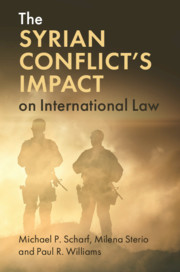Book contents
- The Syrian Conflict’s Impact on International Law
- The Syrian Conflict’s Impact on International Law
- Copyright page
- Contents
- Authors’ Biographies
- Acknowledgments
- Prologue
- 1 Introduction
- 2 Historical Background
- 3 Accelerated Formation of Customary International Law
- 4 Use of Force in Self-Defense against Non-State Actors
- 5 Humanitarian Intervention in Response to Use of Chemical Weapons
- 6 Transformation of Accountability Paradigms
- 7 The Syrian Migration Crisis
- 8 International Law and the Syrian Peace Process
- 9 Conclusion
- Appendix The Chautauqua Blueprint for a Statute for a Syrian Extraordinary Tribunal to Prosecute Atrocity Crimes
- Index
4 - Use of Force in Self-Defense against Non-State Actors
Published online by Cambridge University Press: 17 March 2020
- The Syrian Conflict’s Impact on International Law
- The Syrian Conflict’s Impact on International Law
- Copyright page
- Contents
- Authors’ Biographies
- Acknowledgments
- Prologue
- 1 Introduction
- 2 Historical Background
- 3 Accelerated Formation of Customary International Law
- 4 Use of Force in Self-Defense against Non-State Actors
- 5 Humanitarian Intervention in Response to Use of Chemical Weapons
- 6 Transformation of Accountability Paradigms
- 7 The Syrian Migration Crisis
- 8 International Law and the Syrian Peace Process
- 9 Conclusion
- Appendix The Chautauqua Blueprint for a Statute for a Syrian Extraordinary Tribunal to Prosecute Atrocity Crimes
- Index
Summary
In 2014, a militant group calling itself the Islamic State (ISIS) rapidly took over more than 30 percent of the territory of Syria and Iraq. In the process, it captured billions of dollars (US) worth of oil fields and refineries, bank assets and antiquities, tanks, and armaments, and became one of the greatest threats to peace and security in the Middle East. In an effort to “degrade and defeat” ISIS, the United States, assisted by a handful of other Western and Arab countries, launched thousands of bombing sorties and cruise missile attacks against ISIS targets in Iraq and Syria since August 2014. While the Iraqi government had consented to foreign military action against ISIS within Iraq, the Syrian government did not. Rather, Syria protested that the air strikes in Syrian territory were an unjustifiable violation of international law.
- Type
- Chapter
- Information
- The Syrian Conflict's Impact on International Law , pp. 29 - 58Publisher: Cambridge University PressPrint publication year: 2020



